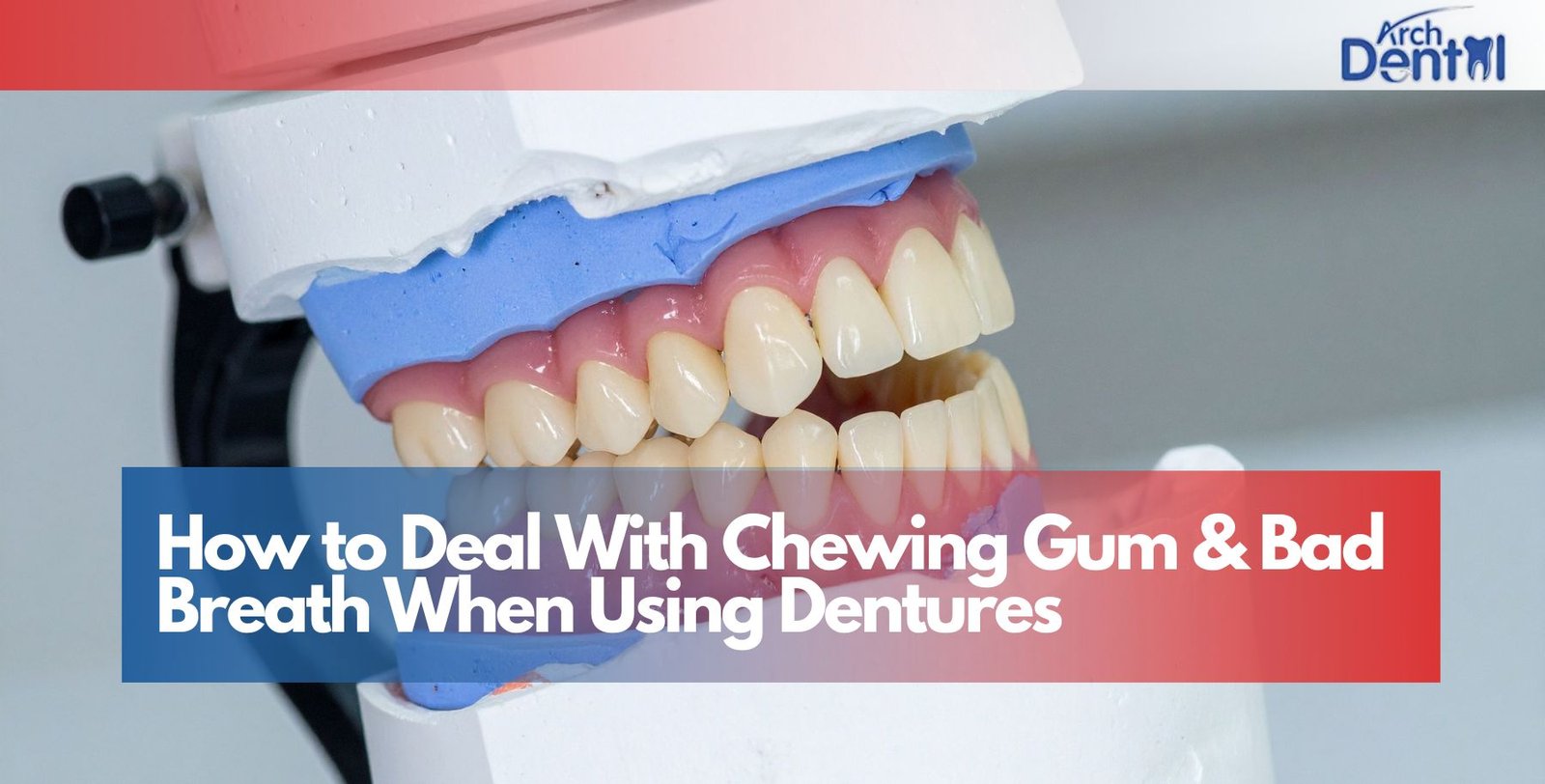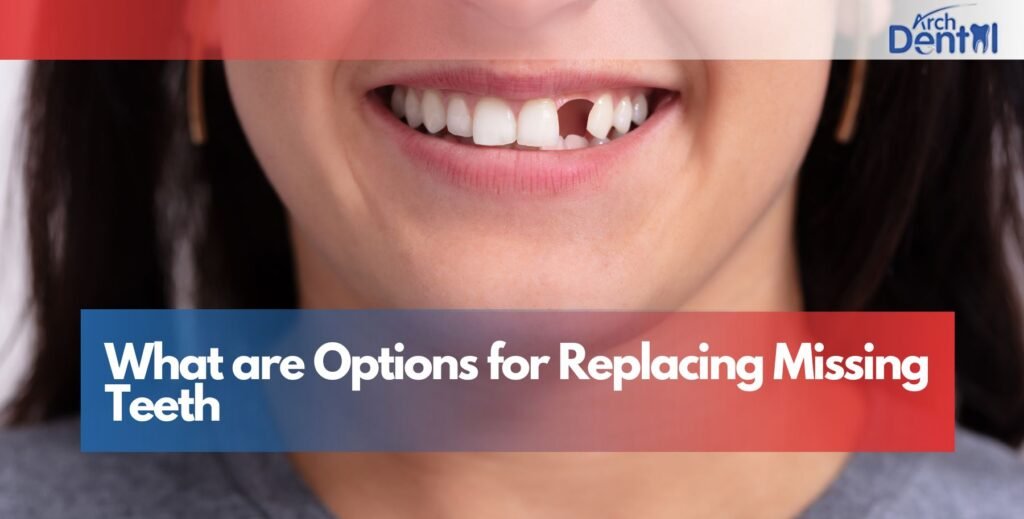Wearing dentures can transform your smile, restore chewing ability, and give you confidence — but it also brings new daily challenges. Two of the most common concerns denture wearers face are chewing gum sticking to dentures and bad breath caused by dentures.
Many people believe they must avoid gum entirely or that denture breath is unavoidable. The truth is, with the right techniques, products, and habits, you can enjoy fresh breath, minty confidence, and even sugar-free gum without damaging or loosening your dentures.
This guide explains everything you need to know using a clear, dentist-approved perspective. Whether you wear full dentures, partial dentures, or implant-supported dentures, this article helps you manage chewing gum, eliminate bad breath, and maintain excellent oral hygiene.
Let’s begin by understanding how dentures interact with saliva, food, gum, and oral bacteria — the foundation of preventing problems.
Benefits of Chewing Gum for Denture Wearers
Chewing gum often gets a bad reputation among denture wearers. Many fear it will stick, loosen dentures, or cause damage. While this can be true with regular gum, specially formulated dental gum can actually be helpful.
Before choosing gum, it’s important to understand why dentures change the way your mouth responds to chewing.
Increased Saliva Production Supports Denture Comfort
Chewing sugar-free gum stimulates saliva flow. Denture wearers often struggle with dry mouth due to reduced salivary gland activity, medication use, aging, or health conditions.
Saliva helps by:
- Lubricating dentures
- Improving suction for upper dentures
- Reducing sore spots
- Preventing mouth sores
- Aiding speech clarity
Moisture creates the ideal environment for dentures to feel natural.
Gum Helps Clean the Mouth Between Meals
Sugar-free dental gum can lift food debris from denture teeth, helping to reduce plaque buildup. While chewing gum cannot replace brushing or soaking, it can help keep your mouth fresher during the day.
Gum Can Improve Denture Stability for Some Wearers
Light chewing activates the jaw muscles and helps dentures settle into place, especially during the first few months of denture use. Observation by a dentist northampton confirms that gentle chewing helps new denture wearers adapt more comfortably.
Gum Can Reduce Bad Breath
As saliva increases, odor-causing bacteria are washed away more easily. Sugar-free gum also delivers mint or xylitol, which freshens breath naturally.
Causes of Bad Breath While Wearing Dentures
Bad breath related to dentures often called “denture breath” is extremely common. However, it is not normal. It happens because dentures can trap bacteria, food particles, and yeast in ways natural teeth do not.
Understanding the cause is the first step toward eliminating the problem.
Bacteria Accumulate on Denture Surfaces
Denture material is porous. Bacteria cling to microscopic pits and release odor-producing gases. If dentures are not cleaned properly, odors will persist regardless of how often you rinse your mouth.
Improper Night-Time Denture Care
Sleeping with dentures in restricts saliva flow and allows bacteria to multiply in warm, dark conditions. Removing dentures at night is critical for hygiene and overall oral health.
Poorly Fitting Dentures Trap Food
Loose dentures can trap food particles underneath. As the food decays, it creates odor similar to chronic halitosis.
Dry Mouth Makes Denture Odors Worse
Less saliva = more bacteria. Denture wearers frequently develop dry mouth due to:
- Aging
- Antihistamines
- Blood pressure medication
- Depression medication
- Autoimmune disorders
A dry mouth encourages plaque and odor formation.
Gum Disease Under or Around Dentures
Partial denture wearers risk gum infections around natural teeth. Full denture wearers can also develop gum inflammation from fungal infections, poorly cleaned dentures, or denture irritation.
Ways to Avoid Bad Breath with Dentures
You can completely eliminate denture breath with consistent habits. Below are expert-approved methods that keep your mouth fresh all day.
Proper Daily Denture Cleaning
Denture cleaning must be more thorough than brushing natural teeth. Clean dentures twice daily using:
- A denture brush
- Non-abrasive denture cleanser
- Warm, not hot, water
Avoid toothpaste it scratches dentures and allows odor-causing bacteria to accumulate.
Soak Dentures Overnight
Use an overnight cleansing solution to dissolve plaque, kill bacteria, and disinfect the appliance. This step is non-negotiable for odor prevention.
Brush Your Gums, Tongue, and Palate
Bad breath often comes from unclean soft tissues. Brush the tongue and palate gently with a soft brush before inserting dentures.
Keep the Mouth Hydrated
Drink water throughout the day to reduce dry mouth. Saliva substitutes and xylitol gum also help.
Use Antibacterial Mouthwash
Choose alcohol-free rinses to avoid worsening dry mouth.
Ensure Proper Denture Fit
Ill-fitting dentures create pockets where bacteria thrive. Relines and adjustments restore proper suction and hygiene.
Which Sugar-Free Chewing Gum Doesn’t Stick to Dentures
Some chewing gums are specially designed not to stick to dentures. Regular gum is too soft and adhesive, and it bonds easily to acrylic surfaces. The following types of gum are denture-friendly.
Xylitol-Based Sugar-Free Gum
Xylitol gum is firmer and less sticky than regular gum, making it a good option for most denture wearers.
ADA-Approved Dental Gum
Brands with the American Dental Association seal are formulated to prevent sticking and encourage saliva flow. Examples include:
- Trident White
- Freedent
- Wrigley’s Extra Professional
Silicone-Based Chewing Options
These specialty chewing aids mimic gum without residue and are ideal for denture wearers with especially sticky tendencies.
What’s the Easiest Way to Remove Chewing Gum from Dentures
If gum sticks to your dentures, don’t panic it can be removed safely using simple methods.
Place Dentures in the Freezer for a Few Minutes
Cold temperature stiffens the gum, making it easier to lift off.
Use Warm Water and a Denture Brush
Gently scrub the affected area, being careful not to scratch the denture surface.
Apply a Small Amount of Cooking Oil
Oil breaks down the gum’s tackiness. Wipe away the residue fully and clean dentures afterward with soap or cleanser.
Use Denture Cleaning Tablets
Effervescent tablets dissolve gum fragments without damaging denture material.
How Dentures Affect Saliva, Taste, and Oral Hygiene
Denture wearers often experience changes in the way they taste food, produce saliva, and maintain oral cleanliness. These changes can influence gum behavior and bad breath.
Reduced Saliva Flow
Less saliva increases odor, makes chewing gum stickier, and contributes to bacterial buildup.
Denture Material Alters Taste
Acrylic, resin, or metal components may temporarily affect taste buds.
Denture Plaque Forms Quickly
Plaque collects on dentures just as it does on natural teeth. Once hardened, it becomes tartar that holds odor tightly.
How to Deal With Dry Mouth When Wearing Dentures
Dry mouth (xerostomia) leads to chronic bad breath and discomfort. Managing dryness is essential for fresh breath.
Hydration Techniques
Drink water regularly and avoid caffeine, alcohol, and smoking.
Saliva Substitutes
Products like Biotène provide relief throughout the day.
Xylitol Gum Stimulation
Chewing non-stick gum encourages saliva production safely.
Dietary Choices That Affect Bad Breath in Denture Wearers
Food choices affect denture odors. A breath-friendly diet can help significantly.
Foods That Increase Bad Breath
Avoid:
- Garlic
- Onion
- Strong spices
- Coffee
- Alcohol
Foods That Improve Freshness
Choose:
- Fresh fruits
- Water-rich vegetables
- Sugar-free mints
- Parsley, mint, and green tea
Avoid Sticky Sugary Foods
Caramel, taffy, and sticky candy cling to dentures and cause bacterial growth.
Cleaning Routine for Denture Wearers to Prevent Odors
A proper hygiene routine is essential for fresh breath.
Morning Routine
- Clean dentures
- Brush gums and tongue
- Rinse with antibacterial rinse
Afternoon Routine
- Use xylitol gum
- Rinse after meals
Night Routine
- Remove dentures
- Clean thoroughly
- Soak overnight
This is critical for avoiding fungal infections and odors.
How to Clean Dentures Properly to Avoid Bad Breath
This section outlines a complete step-by-step cleaning routine.
Step 1 — Rinse Immediately After Eating
Wash away loose food particles.
Step 2 — Brush with Denture Cleanser
Use warm water and a denture brush with gentle strokes.
Step 3 — Soak Overnight
Use tablets or cleansing solutions.
Step 4 — Clean the Mouth
Brush gums, palate, and tongue.
Step 5 — Store Properly
Keep dentures moist when not in use.
How to Store Dentures Properly
Proper storage prevents bacteria, cracking, and warping.
Use a Denture Case with Ventilation
Allow airflow to prevent odor.
Keep Dentures Moist
Dry dentures crack and trap bacteria.
Use Fresh Cleaning Solution Daily
Never reuse yesterday’s soak bacteria multiply quickly.
How Professional Denture Checkups Help Prevent Gum & Breath Issues
Routine checkups are critical to oral hygiene.
Denture Fit Assessment
Loose dentures cause gum irritation and food trapping.
Oral Cancer Screening
Early detection saves lives.
Professional Cleaning
Dentists remove tartar and bacteria from dentures and the mouth that home care can’t.
How to Prevent Gum Irritation from Chewing Gum and Dentures
Gum irritation causes swelling, redness, and odor.
Choose Soft Foods
Hard or sticky foods pull on dentures.
Avoid Sticky Gum
Choose non-stick dental gum only.
Use Denture Adhesives Properly
Adhesives improve stability and reduce friction.
How Dentures Influence Jaw Movement and Chewing
Jaw mechanics change with dentures.
Learning Curve
New denture wearers must chew slowly and practice regularly.
Chew on Both Sides Equally
This improves balance and reduces tipping.
Smaller Bites
Smaller food pieces prevent pressure on dentures and reduce gum sticking.
Common Myths About Chewing Gum & Dentures
Let’s clarify misleading beliefs.
Myth — All Gum Sticks to Dentures
Only regular gum sticks. Dental gum is safe.
Myth — Gum Damages Dentures
Not if it is sugar-free and non-stick.
Myth — Bad Breath Is Normal with Dentures
Bad breath indicates bacteria or improper cleaning not normal.
Conclusion
Chewing gum and bad breath are common concerns for denture wearers but both can be managed easily with the right techniques, proper cleaning habits, denture-friendly gum choices, and consistent oral hygiene routines.
With daily care, professional guidance, hydration, and proper denture maintenance, you can enjoy fresh breath, a comfortable fit, and confidence in your smile. Whether you wear full or partial dentures, keeping your mouth clean and choosing safe chewing gum can make a huge difference.
If you ever have questions about denture care, adjustments, or cleaning, clinics offering Full Dentures & Partial Dentures in Northampton, MA can provide personalized guidance and professional support.
FAQs
Can partial dentures damage the anchor teeth in the long run?
Yes. Poorly fitting partial dentures place extra pressure on anchor teeth, causing looseness, cracks, or decay. Regular adjustments prevent this.
What are the downsides to dentures?
Possible downsides include loosening over time, difficulty eating hard foods, changes in flavor, gum irritation, and increased cleaning requirements. However, proper fit and good hygiene minimize these issues.
What are my denture options with just upper canines remaining?
You may be a candidate for partial dentures, implant-supported dentures, or overdentures. A dentist can evaluate bone strength and remaining tooth stability.
Are my dentures causing me to have bad breath?
Yes, if dentures are not cleaned properly or worn overnight. Bacteria accumulate on denture surfaces and produce strong odors.
Why dentures smell and what to do about it
Odors come from bacteria, plaque, yeast, and food trapped under dentures. Clean daily, soak nightly, brush your gums, and ensure proper denture fit.
How to prevent bad breath with dentures?
Clean dentures daily, soak overnight, brush your gums and tongue, use xylitol gum, stay hydrated, and schedule routine dental visits.
Can I chew gum with dentures?
Yes as long as it is non-stick, sugar-free gum designed for denture wearers.
How to clean gums when wearing dentures?
Remove dentures, brush gums gently with a soft-bristle brush, rinse with warm salt water, and massage gums to increase blood flow.
How to get rid of bad breath coming from gum?
Clean dentures thoroughly, brush the tongue, rinse with antibacterial mouthwash, stay hydrated, and avoid sugary foods.





